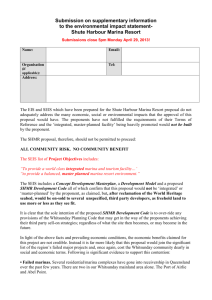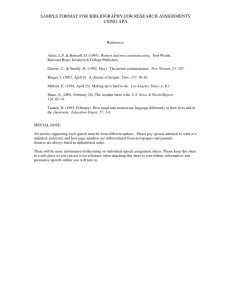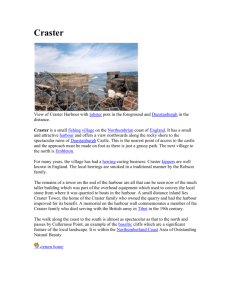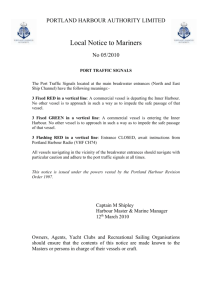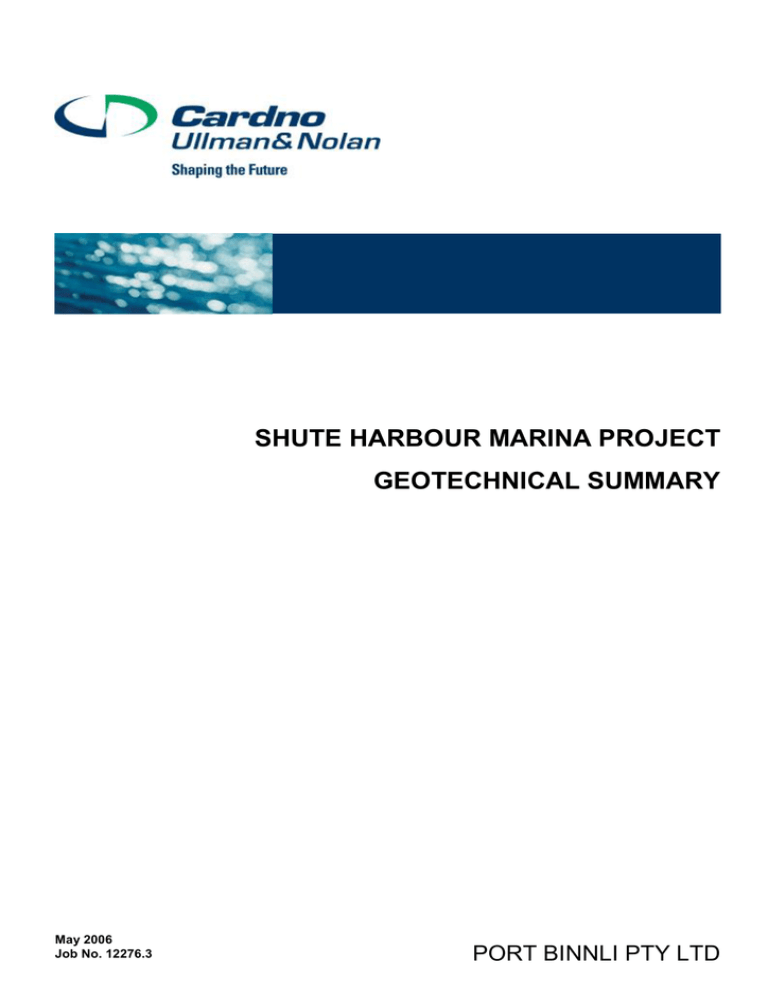
SHUTE HARBOUR MARINA PROJECT
GEOTECHNICAL SUMMARY
May 2006
Job No. 12276.3
PORT BINNLI PTY LTD
SHUTE HARBOUR MARINA PROJECT
GEOTECHNICAL SUMMARY
Cardno Ullman & Nolan Geotechnic Pty Ltd
ABN 45 103 205 205
71 Connors Road
PO Box 5630 Mackay MC
Queensland 4741 Australia
Telephone: 07 4952 5255
Facsimile: 07 4952 5455
International: +61 7 4952 5255
Email: soils@uneng.com.au
Web: www.cardno.com.au
Document Control
Version
Date
1
May 2006
Author
Name
Reviewer
Initials
P Davis
Name
Initials
A Williams
"© 2006 Cardno Ullman & Nolan Geotechnic Pty Ltd All Rights Reserved. Copyright in the whole and
every part of this document belongs to Cardno Ullman & Nolan Geotechnic Pty Ltd and may not be
used, sold, transferred, copied or reproduced in whole or in part in any manner or form or in or on any
media to any person without the prior written consent of Cardno Ullman & Nolan Geotechnic Pty Ltd.”
PORT BINNLI PTY LTD
Version 1
Z:\Geotech\FILES\PAJD\Port Binnli - Geo Summary\Port Binnli_Shute Harbour 18-05-06.doc
May 2006
Page i
SHUTE HARBOUR MARINA PROJECT
GEOTECHNICAL SUMMARY
SHUTE HARBOUR MARINA PROJECT
GEOTECHNICAL SUMMARY
TABLE OF CONTENTS
1.
LETTER OF TRANSMITTAL ............................................................................................ 1
2.
SCOPE OF WORK ........................................................................................................... 2
3.
GEOMORPHOLOGY, GEOLOGY, SOILS........................................................................ 2
3.1
3.2
3.3
3.4
3.5
3.6
Regional Geology ...................................................................................................... 2
Local Geology ............................................................................................................ 3
Topography & Geomorphology .................................................................................. 3
Soils........................................................................................................................... 5
Hillside ....................................................................................................................... 6
Typical Cross Section ................................................................................................ 6
4.
EXCAVATIONS AND FILLING ......................................................................................... 6
5.
REVETMENTS.................................................................................................................. 6
5.1 Sheet Piling................................................................................................................ 7
5.2 Rock Revetments....................................................................................................... 7
6.
ACID SULFATE SOILS AND SEDIMENT CONTAMINATION.......................................... 7
7.
LIMITATIONS ................................................................................................................... 8
LIST OF FIGURES
Figure 1
Figure 2
Figure 3
Geology Map
Locality Plan
Typical Cross Section
ATTACHMENTS
ATTACHMENT A
ATTACHMENT B
ATTACHMENT C
PORT BINNLI PTY LTD
Descriptive Logs
Dynamic Cone Penetrometer Results
Laboratory Test Results
Version 1
Z:\Geotech\FILES\PAJD\Port Binnli - Geo Summary\Port Binnli_Shute Harbour 18-05-06.doc
May 2006
Page ii
Our Ref
12276.1
Contact
Peter Davis
23 May 2006
Cardno Ullman & Nolan
Geotechnic Pty Ltd
1.
LETTER OF TRANSMITTAL
The Manager
Port Binnli Pty Ltd
PO Box 1003
SPRING HILL QLD 4004
Dear Jeff
SHUTE HARBOUR MARINA PROJECT
GEOTECHNICAL SUMMARY
Further to your recent instructions, we are pleased to present in this report a
geotechnical summary of the Shute Harbour Marina project site based upon the
data collected by Ullman & Nolan. The report summarises the findings of
previous and recent works and notes that sea bed sediments comprise mainly
very soft or soft highly plastic clays with a surface covering up to about 1m thick
of more sandy / gravelly sediments. The sediments are underlain by weathered
volcanics which, over the seaward part of the site, have a thin covering, typically
about 1-2m thick, of residual clayey soil.
Figure 3 shows what we believe to be a typical cross section for the project site,
perpendicular to the shore line.
Yours faithfully
Peter Davis
for Cardno Ullman & Nolan
ABN 45 103 205 205
71 Connors Road, Mackay Qld
4740
PO Box 5630, Mackay MC
Queensland 4741 Australia
Telephone: 07 4952 5255
Facsimile: 07 4952 5455
International: +61 7 4952 5255
soils@uneng.com.au
www.cardno.com.au
Cardno Offices
Brisbane
Sydney
Canberra
Melbourne
Perth
Darwin
Cairns
Townsville
Mackay
Rockhampton
Hervey Bay
Sunshine Coast
Toowoomba
Gold Coast
Gosford
Baulkham Hills
Busselton
Papua New Guinea
Indonesia
Vietnam
China
Kenya
United Arab Emirates
United Kingdom
United States
SHUTE HARBOUR MARINA PROJECT
GEOTECHNICAL SUMMARY
2.
SCOPE OF WORK
This report has been commissioned by Mr J Smith of Port Binnli Pty Ltd. We
understand that Port Binnli has recently become involved in this project, which hitherto
has been managed by Kinsmen Pty Ltd.
The report provides a summary of the geotechnical information recovered for the
project site over a period of 30 years or so by the Ullman & Nolan Group, and an
overview of the ground conditions as may be relevant to site development.
The following documents provide input to this compilation
•
•
•
•
Ullman & Nolan Pty Ltd. Club Whitsunday Project. Report on Offshore
Geotechnical Investigations. Report to Scotex Pty Ltd dated July 1989.
Ullman & Nolan Pty Ltd. Shute Harbour Marina.
Report on Further
Geotechnical Investigation. Report to Kinsmen Pty Ltd dated June 2001.
Ullman & Nolan Technical Services Pty Ltd. Shute Harbour Marina. Report on
Acid Sulphate Soils and Sediment Contaminated Investigation. Report to Shute
Harbour Marina Developments Pty Ltd dated January 2005.
Cardno Ullman & Nolan Pty Ltd. Shute Harbour Marina Project. Compilation of
Geotechnical Information. Report to Port Binnli Pty Ltd dated 12 April 2006.
Relevant extracts from these reports are appended.
In addition, the findings of recent site specific geotechnical investigation program have
been utilised. This recent information has not previously been reported.
Reference should be made also to a compilation report for the nearby Shute Harbour
Jetty precinct, viz
•
3.
Ullman & Nolan Consulting Pty Ltd. Shute Harbour Ferry Terminal. Report on
Geotechnical Appraisal. Report to Shift Whitsunday Pty Ltd dated July 2005.
GEOMORPHOLOGY, GEOLOGY, SOILS
3.1
Regional Geology
The regional geology for the site is described in the 1:250,000 Geological Series Sheet
for Proserpine. The geology of the area is typical of the surrounding Whitsunday area,
comprising volcanoclastic sediments interlain with intermediate volcanic flows and
minor intrusions. The rocks from part of the Whitsunday Volcanic Province, an early
Cretaceous aged sequence.
Geological faults are generally NW-SE trending, with the closest known one being the
submarine Molle Fault, some 5km to the east of the site. The University of Queensland
reports the hazard assessment of earthquakes associated with faults such as this is
difficult, primarily because of the paucity of historical seismic data and a sparse seismic
network. Due to the cessation of the University of Queensland monitoring program,
application of advanced forecasting or predictive methods is not possible. As a result,
information is provided by:
PORT BINNLI PTY LTD
Version 1
Z:\Geotech\FILES\PAJD\Port Binnli - Geo Summary\Port Binnli_Shute Harbour 18-05-06.doc
May 2006
Page 2
SHUTE HARBOUR MARINA PROJECT
GEOTECHNICAL SUMMARY
·
·
Queensland University Advanced Centre for Earthquake Studies, giving
locations of earthquake epicentres and their magnitudes, and values of
acceleration coefficients; and
AS 1170.4 – Earthquake loads – Figure 2.3(g), acceleration coefficients.
It can be determined from this information that, while an earthquake risk exists for the
Shute Harbour area, the hazard is small.
Changes to relative sea and land levels have resulted in the area becoming drowned
during the Tertiary Period. Overlying the basement rock at and below the shoreline are
recent to Holocene aged marine sediments. These are typically soft, dark grey,
medium plasticity silty clays with shells and coral fragments.
The geology of the area to be affected is shown in Figure 1
3.2
Local Geology
The bedrock of the Shute Harbour peninsular consists of the Whitsunday Volcanics of
Lower Cretaceous age (S.E. Bryan et al (1997)). This large scale volcanic unit has
been folded into a large open syncline which plunges south or south-south west at a
low to moderate angle. Bedrock typically consists of rhyolite, andesite, and a
sequence of very similar lava flows. In some areas, the lava flows have been intruded
by steeply dipping dykes. Bedrock is typically red-brown to blue-grey in colour, often
porphyritic with small white anhedral phenocrysts of plagioclase. The lava is typically
highly fractured, with fractures only a few centimetres apart. Flow structure is common.
The andesite and rhyolite are less fractured. Fractures are usually irregular and
random.
Recently published data described the rock comprising the cut batters to the Shute
Harbour car park as older Triassic rhyolitic basement material.
Weathering varies from highly to moderately weathered, to slightly weathered or fresh.
Where dykes are present, these are often extremely to highly weathered, 1m to 3m
wide, and steeply inclined.
3.3
Topography & Geomorphology
The general topography of the site is characterised by a steep, east west trending
rocky hillslope above high water mark, a narrow wave-cut platform, and beach and sea
bed below high water mark. Shute Harbour Road follows the foreshore, having been
constructed on a cut to fill earthworks bench at a level of between about relative level
(RL) 5 metres and RL 7 metres AHD.
The rocky hillslope is up to about 35m high at the northwestern boundary of the site,
but continues rising within the adjacent National Park to the north. The northeast
boundary is also hillside, but only about 25m high. Again the land continues rising to
the north within the National Park. In some parts, notably the lower slopes, residual
and colluvial soils to about 2m maximum thickness exist.
The centre section of the northern boundary is lower lying. Two adjacent alluvial lined
gulleys at about RL 5 metres AHD are located at the toe of the hillslope, immediately to
the north of Shute Harbour Road.
PORT BINNLI PTY LTD
Version 1
Z:\Geotech\FILES\PAJD\Port Binnli - Geo Summary\Port Binnli_Shute Harbour 18-05-06.doc
May 2006
Page 3
SHUTE HARBOUR MARINA PROJECT
GEOTECHNICAL SUMMARY
The dominant rocks at the site have been classified as acid and intermediate
pyroclastic flows of the Airlie Volcanics. The Airlie Volcanics were deposited in fresh
water in the Permian Period and have subsequently been folded into a large, open
syncline, which plunges south or south southwest at a low to moderate angle. Dips are
moderate to low on the western limb and steeper on the eastern limb, nearer to the
site.
Flow banded rhyolite is the dominant rock type observed in the road cuttings at the site.
Localised folding of beds is also evident. A number of microdiorite (dolerite) dykes are
recorded on the geological sheet, which strike approximately north south. These are
clearly visible as relatively narrow (about 1m, but up to 5m wide) deeply weathered,
subvertical zones within the flow banded rhyolite.
The predominantly fine grained nature of the marine sediments reflects the depositional
environment of the Shute Bay Inlet. A slightly coarser grained material occurs for a
thickness of less than about 1m over the sea bed over part of the site, predominantly
the western half. This has likely resulted from a ‘sorting’ process where wave and tide
action has washed out the finer grained clays and silts. Coarser material have also
been deposited nearer the high water mark with cobbles and gravel forming a beach
like shore which supports mangrove. The finer grained silts and clays generally occur
below low water tide level and increase in depth to more than 10m towards the centre
of the bay.
Four principal terrain units are present at this site, being
·
·
·
·
Steep hillslopes;
Alluvial and colluvial deposists north of Shute Harbour Road;
Beach sediments; and
Marine sediments (muds).
Despite the hard and resistant nature of the rocky hillslopes and the vegetation cover of
low open woodland to open eucalypt forest, the combination of relatively steep slopes
and fractured nature of the rock exposures is conducive to the formation of landslips
and rock slides. This is the principal land forming feature in this geomorphology. As a
result, colluvium on the lower footslopes is common, with the beach deposits typically
being of colluvial origin. This colluvium is then reworked and broken down further by
tidal action.
The rate of landform change in this land based topography as a result of erosion is
variable, depending principally upon the incidence of prolonged wet weather, which
exacerbates both instability and the erosion process.
The alluvial and marine sediments are likewise subject to erosion during high rainfall
events and storm activity.
PORT BINNLI PTY LTD
Version 1
Z:\Geotech\FILES\PAJD\Port Binnli - Geo Summary\Port Binnli_Shute Harbour 18-05-06.doc
May 2006
Page 4
SHUTE HARBOUR MARINA PROJECT
GEOTECHNICAL SUMMARY
3.4
Soils
The soil cover is generally very thin on the hill slopes, typically less than 0.6m. The
soils typically consist of pale brown-grey sandy gravels or gravely sands with some
clay and silt. They are either non-plastic or of low plasticity. The soils derive from
weathering of bedrock and in may places are covered by a thin veneer of angular
scree. Some of this scree has accumulated at the bottom of the slopes and, together
with coral, sand , gravel and mud, now forms the beach / storm deposit shown on the
typical cross section (Figure 3).
Below about RL -1 AHD, the common soil type is very soft or soft highly plastic silty
clay. In the upper levels it commonly contains gravel and sand sized coral and shell
pieces. In other instances, the gravel comprises andesite and rhyolite, no doubt
slopewash or scree from the adjacent hillsides. Coral boulders within the soft clay are
not uncommon.
The surface soils overlying the soft clay tend to comprise more sandy and gravely
material. In some but not all areas, this surface soil can contain very little fines and be
up to 3m thick. But more commonly it is between about 0.2m and 0.5m thick.
For purposes of site characterisation, it is reasonable to assume that the stratigraphy
within the reclamation area may be typified by
0.0m – 1.5m
Gravelly clayey sand.
Gravel and sand
components are fine to coarse grained and
comprise principally shell and coral debris.
The fines are medium to high plasticity and
comprise some 20 – 50% of the total material.
Occasional cobbles and boulders of coral to
300mm size.
1.5m – 4.0m
Gravelly sandy clay.
Gravel and sand
components are fine to coarse grained and
comprise principally shell and coral debris.
The fines are medium to high plasticity and
comprise some 50 – 70% of the total material.
Cobbles and boulders of coral to 600mm size
are common.
Towards the shoreward edge of the reclamation area, the gravel component includes
angular rock fragments, being slopewash from the fringing hillsides.
Within the marina basin, it would be prudent to assume that dredge materials will
comprise a combination of gravelly clayey sand (top ≈1.7m over the western part of the
site) and silt / clay (elsewhere).
PORT BINNLI PTY LTD
Version 1
Z:\Geotech\FILES\PAJD\Port Binnli - Geo Summary\Port Binnli_Shute Harbour 18-05-06.doc
May 2006
Page 5
SHUTE HARBOUR MARINA PROJECT
GEOTECHNICAL SUMMARY
3.5
Hillside
A 1993 seismic survey undertaken for Ullman & Nolan Pty Ltd by Velseis Pty Ltd
indicated that weathered rock within the top 5 to 14m (but typical 8 to 10m) had a
seismic velocity less than 2,000 m/s. Knowledge of local geology would suggest that
this upper horizon comprises distinctly and more weathered flow banded rhyolite with a
number of deeply weathered, sub-vertical microdiorite dykes.
At depth, the rock is the same type but less weathered.
It is understood that the current development proposal does not extend into the
adjacent hillside, north of Shute Harbour Road hence no further comment on hillside
ground conditions is offered in this geotechnical summary.
3.6
Typical Cross Section
The attached Figure 2 shows the location of a typical cross section through the project site,
perpendicular to the shoreline. The cross section is shown in Figure 3.
While it is said that this cross section is typical, it is presented in the centre of the site
where Shute Harbour Road is on fill. In other parts of the site, the road is in cut, but the
profile seaward of the shoreline remains similar to that shown.
4.
EXCAVATIONS AND FILLING
Conventional dredge excavation of the marine sediments is expected to prove effective
but will have the usual disadvantage of providing reclamation fill of ‘slurry’ consistency.
Problems of low shear strength and high settlement potential result, but may possibly
be mitigated by careful selection of material for dredging.
Dredge excavation of the underlying weathered rock is unlikely to prove successful.
The quantum of post-construction settlement of fill will vary across the site as ground
conditions and fill conditions vary. Our earlier evaluations have indicated a potential for
50 to 200mm post-construction settlement within the insitu sediments. This may now
increase if the reclamation and revetment are to be moved seaward. Post-construction
settlement within the hydraulically placed fill material may be considerably more than
this.
5.
REVETMENTS
Revetments may take the form of either sheet piling or conventional earth / rock
embankments. It is understood that sheet piling with tie backs is the preferred
revetment system.
PORT BINNLI PTY LTD
Version 1
Z:\Geotech\FILES\PAJD\Port Binnli - Geo Summary\Port Binnli_Shute Harbour 18-05-06.doc
May 2006
Page 6
SHUTE HARBOUR MARINA PROJECT
GEOTECHNICAL SUMMARY
5.1
Sheet Piling
Our recent experience with sheet pile revetments for a nearby project suggests that
sheet piles will need to be either cantilevered from their penetration into residual soils
and weathered rock, for which driving conditions will be relatively hard or provided with
tie backs.
It is unlikely that tied sheet piling can be used with passive deadman restraint in the
reclamation filling. Design experience suggests that adequate stability will not be
achieved using this method. It is likely that tie backs will need to be restrained by raker
piles.
5.2
Rock Revetments
Conventional earth / rock revetments will prove a viable option provided the revetment
embankment displaces much of the marine mud over which it is constructed.
The stability of rock revetments will be dependent on
•
•
•
•
•
•
The height of revetment,
The face slope of the revetment,
The characteristics of the fill material behind the revetment,
The method of construction of the revetment,
The presence of weak marine sediments beneath the toe of the revetment,
The proximity of the toe of the revetment to the dredge batter.
Revetment design will need to take these factors into account.
6.
ACID SULFATE SOILS AND SEDIMENT CONTAMINATION
The likely presence and distribution of acid sulfate soils and sediment contamination
has been addressed by the January 2005 report. The report notes that the need to
manage acid sulfate soils is unlikely on account of the excess acid neutralising capacity
of the marine sediments. This will, however, need to be checked by monitoring during
excavation and a management plan be available in the event that the acid neutralising
capacity is found to be insufficient.
The presence of TBT has been noted, albeit in localised areas.
strategy will be required.
PORT BINNLI PTY LTD
Version 1
Z:\Geotech\FILES\PAJD\Port Binnli - Geo Summary\Port Binnli_Shute Harbour 18-05-06.doc
A management
May 2006
Page 7
SHUTE HARBOUR MARINA PROJECT
GEOTECHNICAL SUMMARY
7.
LIMITATIONS
As noted in Section 2.0 of this report, the information contained herein is a summary of
data recovered by Ullman & Nolan and others for this site. Reference is also made to a
compilation report prepared by Ullman & Nolan for Shift Whitsunday Pty Ltd for the
Shute Harbour Jetty precinct.
While every effort has been made to portray the geotechnical characteristics of the
subject site in a representative manner, it needs to be recognised that geotechnical
investigations are still under way and have not yet provided the geotechnical
parameters required for design.
PORT BINNLI PTY LTD
Version 1
Z:\Geotech\FILES\PAJD\Port Binnli - Geo Summary\Port Binnli_Shute Harbour 18-05-06.doc
May 2006
Page 8
SHUTE HARBOUR MARINA PROJECT
GEOTECHNICAL SUMMARY
FIGURES
Figure 1
Geology Map
Figure 2
Locality Plan
Figure 3
Typical Cross Section
PORT BINNLI PTY LTD
Version 1
Z:\Geotech\FILES\PAJD\Port Binnli - Geo Summary\Port Binnli_Shute Harbour 18-05-06.doc
May 2006

